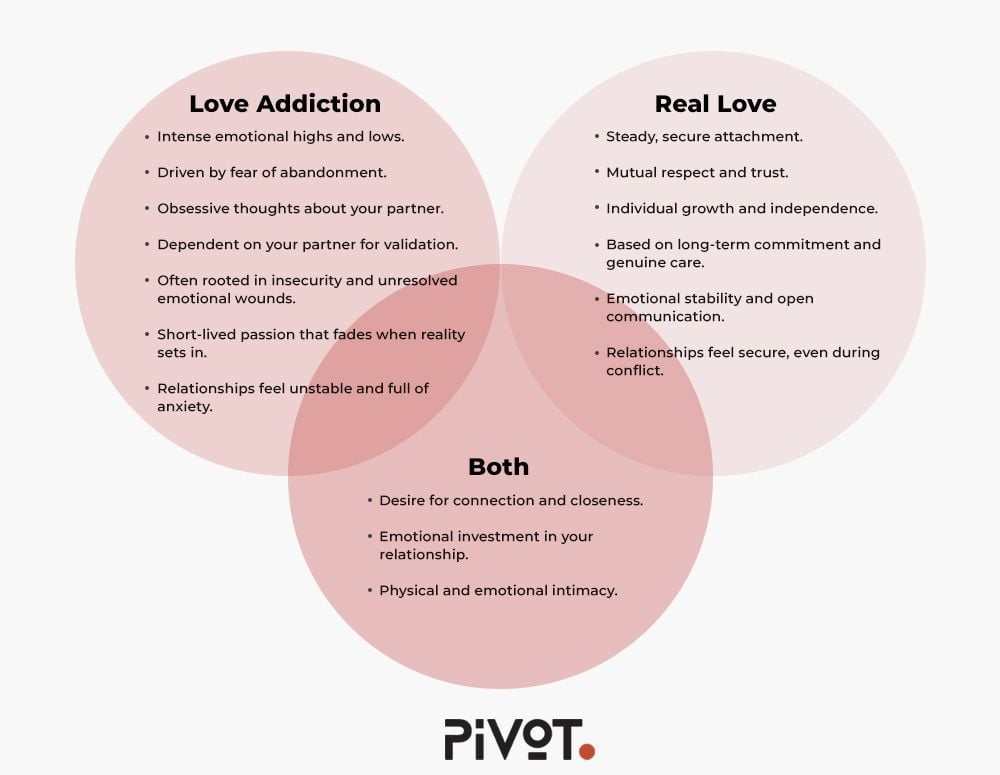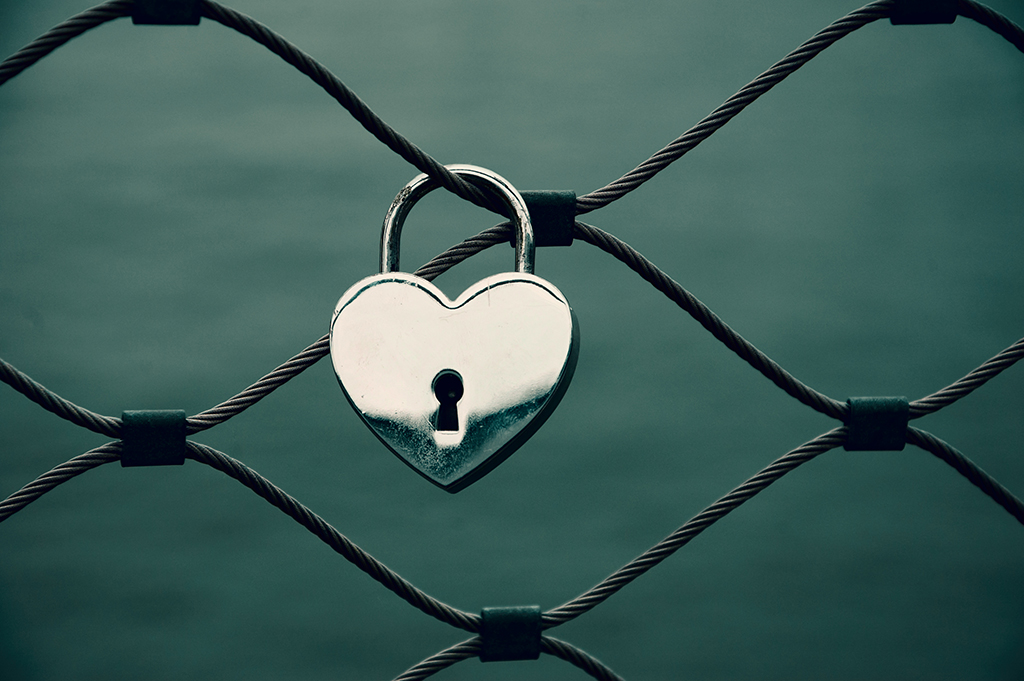We all crave love — it’s one of the most human emotions. But, for some, the need for love morphs into an all-consuming addiction. Love addiction, otherwise known as attachment dysregulation, can feel intense, sweeping you into passion-filled highs only to drag you into devastating lows when that love is threatened. So, how do you know if what you’re feeling is true love or something more harmful?
In the realm of love, the lines between healthy attachment and attachment dysregulation can get blurry. If you’re constantly questioning the stability of your relationship, it’s important to explore the differences between love addiction vs. real love. PIVOT coaches offer individual and couples relationship coaching as well as private retreats to help you sort through your feelings and break free from the emotional turmoil that attachment dysregulation often brings.
Love Addiction vs. Real Love
Both love addiction and real love come with similar feelings of intense connection and all-consuming focus. But they differ in many key ways. Love addiction is fueled by insecurity and obsession, whereas real love is grounded in mutual respect and emotional security. The diagram below shows you how the two overlap and how you can start to tell the two experiences apart.

The Four Types of Love Addiction
Attachment dysregulation can manifest in many ways, but here are four common types of love addiction.
- Obsessive: You may obsess over your partner, often confusing intensity with intimacy. Boundaries are blurred, and your life revolves around your partner’s approval and presence.
- Romantic: You may be addicted to the thrill of romance. Once the initial high of the honeymoon phase fades, you may seek out a new relationship to feel that rush again.
- Codependent: You focus on caring for your partner to an unhealthy degree, believing you need to sacrifice your own well-being to maintain the relationship.
- Narcissistic: You may crave admiration and attention and use your partner to feel validated.
Differentiating Love Addiction
There are a lot of things that can feel like love addiction, but they are different. PIVOT coaches can help you sort through love addiction and other feelings to get to the root cause of your troubles.
Love Addiction vs. Love Avoidance
Love addiction and love avoidance are two sides of the same coin. If you have a love addiction, you most likely chase closeness and fear abandonment, while people who are love-avoidant fear intimacy and feel suffocated by closeness. A toxic cycle forms where you are constantly pursuing connection, and your partner responds by retreating, creating a push-pull dynamic that leaves both of you unsatisfied and unfulfilled.
Love Addiction vs. Codependency
Love addiction and codependency share many similarities: they both involve unhealthy attachment and reliance on a partner to feel whole or secure. However, in codependency, the focus is on caretaking and control, where you may derive your sense of self-worth from “fixing” or helping your partner. In love addiction, your focus is more on receiving love and validation to fill a personal void rather than on taking care of the other person.
Love Addiction vs. Anxious Attachment
Anxious attachment stems from insecurity and fear of abandonment, much like love addiction. Both anxious individuals and those with love addiction tend to cling to their partners, overanalyze small interactions, and worry excessively about rejection. The difference is that love addiction is a broader pattern, encompassing the need for romantic intensity and a constant emotional high, whereas anxious attachment is more about seeking consistent reassurance and stability in relationships.

The Root Causes of Love Addiction
At the heart of attachment dysregulation, or love addiction, is often a deep-seated fear of abandonment rooted in early childhood experiences. Whether it’s due to inconsistent caregiving, trauma, or attachment wounds, you may subconsciously believe that love is conditional and must be constantly earned. As a result, you become desperate to secure your partner’s affection, fearing rejection or abandonment at every turn.
Healing from love addiction starts with examining the root causes of your attachment patterns. Working with your PIVOT coach is essential to unpacking your thought processes and behaviors, childhood experiences, and communication preferences to build toward a healthier attachment style.
Can Love Addicts Have Healthy Relationships?
Yes, but it’s complicated. A person struggling with love addiction can still experience moments of connection and genuine care, but these relationships often come with instability, dependency, and fear of abandonment. The truth is, to have a truly healthy relationship, you need to heal your underlying issues and develop healthier patterns of emotional attachment. Real love grows from a place of self-respect, trust, and mutual care, whereas love addiction thrives on anxiety, insecurity, and the need for constant reassurance.
Breaking the Cycle of Love Addiction With PIVOT
Recognizing the difference between love addiction vs. real love is the first step to healing. Real love grows from mutual respect, care, and trust. It feels secure, even when things aren’t perfect. Love addiction, on the other hand, keeps you trapped in a cycle of emotional dependency and fear. Breaking free from love addiction requires introspection, support, and a commitment to self-healing.
PIVOT can help you end this cycle through a transformative approach and proven tools like relationship coaching and individualized retreats. You can learn to identify your attachment style, break toxic patterns, and cultivate healthier, more fulfilling relationships.
If you’re struggling to differentiate between real love and love addiction, you’re not alone. The good news? With the right guidance and support, you can learn to let go of addictive love, build emotional resilience, and step into a life where you experience true connection — without fear, obsession, and anxiety.By working with PIVOT, individuals can break free from the cycle of love addiction, rediscover their own sense of self-worth, and create healthier relationships. If you need help differentiating between love addiction vs. real love, reach out online or at 1-855-452-0707.